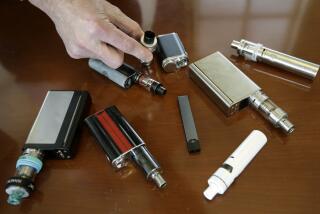Teens’ Efforts to Buy Cigarettes Go Up in Smoke : Illinois: Town credits undercover decoys, fines for minors and sellers alike, in keeping cigarettes out of youngsters’ hands.
- Share via
WOODRIDGE, Ill. — Thirteen-year-old Eric Lemons has tried a half-dozen times to buy cigarettes in his home town. No luck.
“They just won’t sell them. They ask for your ID,” he said.
In this middle-class Chicago suburb, youngsters under 18 have about as much chance of buying a pack of cigarettes as they do of buying a bottle of vodka.
It’s a result of one of the nation’s toughest tobacco-control ordinances. Enforced with undercover “sting” operations using teen-age decoys and $25 fines for minors caught with tobacco, the law is credited with cutting teen smoking rates to a fraction of national levels.
“It’s considered model legislation across the United States,” said Diana Hackbarth, a community-health nursing professor at Loyola University of Chicago.
Outlawing the sale of tobacco products to teens isn’t unusual; 44 states set a minimum age for purchasing the product. But actually keeping tobacco out of teens’ hands is unusual; federal experts estimate that by high school age, one youth in three smokes or uses smokeless tobacco.
The Woodridge ordinance has its roots in a junior high school principal’s complaint in 1988 that a student had bought cigarettes at a store just half a block from school.
The complaint went to police Sgt. Bruce (Buzz) Talbot, who came up with the tough anti-tobacco provisions that were enacted in 1989.
Any Woodridge merchant who sells tobacco to the minor can be fined up to $500. Repeat offenders can have their city-issued tobacco sale licenses suspended or revoked. Violators answer to the mayor, who is also the tobacco control commissioner, so cases don’t clog the courts.
Woodridge’s law holds minors accountable too. Anyone under 18 caught with tobacco gets a $25 ticket. If a minor is caught trying to buy tobacco, the ticket is $50.
“Most kids who try to buy (cigarettes) in convenience stores, they’ll get told . . . ‘Get out, or we’ll call the cops,’ ” 13-year-old Lisa Uselis said.
Some youngsters who have been ticketed end up on the other side of the law, as undercover decoys. On a volunteer basis only, they are sent undercover to every licensed tobacco merchant in the city. Each of the city’s 35 tobacco merchants gets an announced visit four times a year.
The first teen decoys were the children of police officers, then their friends and other volunteers.
“The kids really enjoy it,” Talbot said. “To them it’s a big adventure. They feel like they’re James Bond, 007, going out there--police undercover agent.
“They’re very popular at school when they do it. There was some concern that they would be ostracized. It’s just the exact opposite. . . . We have more volunteers than we could possibly use.”
Smoking rates among adolescents in Woodridge have dropped sharply since the law was enacted, according to psychology professor Leonard A. Jason of DePaul University in Chicago, who surveyed local youngsters before and after the ordinance went into effect.
The percentage of seventh- and eighth-graders experimenting with cigarettes dropped by half, and the rate of regular smoking among adolescents dropped by two-thirds, he found.
Merchants, too, have accepted the law.
“I don’t think it’s that much of a hassle,” said Joanne Duffy, manager of Doc’s Drugs. “It takes two seconds to look at a license. I don’t think it’s really good for kids to be smoking.”
More to Read
Sign up for Essential California
The most important California stories and recommendations in your inbox every morning.
You may occasionally receive promotional content from the Los Angeles Times.













